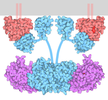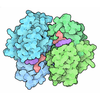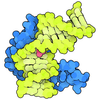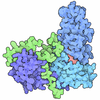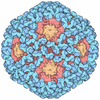[English] 日本語
 Yorodumi
Yorodumi- PDB-9axa: CryoEM structure of activated CRAF/MEK/14-3-3 complex with NST-628 -
+ Open data
Open data
- Basic information
Basic information
| Entry | Database: PDB / ID: 9axa | ||||||
|---|---|---|---|---|---|---|---|
| Title | CryoEM structure of activated CRAF/MEK/14-3-3 complex with NST-628 | ||||||
 Components Components |
| ||||||
 Keywords Keywords | TRANSFERASE / Inhibitor / complex / SIGNALING PROTEIN | ||||||
| Function / homology |  Function and homology information Function and homology informationepithelial cell proliferation involved in lung morphogenesis / death-inducing signaling complex assembly / positive regulation of endodermal cell differentiation / negative regulation of homotypic cell-cell adhesion / negative regulation of hypoxia-induced intrinsic apoptotic signaling pathway / regulation of vascular associated smooth muscle contraction / intermediate filament cytoskeleton organization / regulation of axon regeneration / mitogen-activated protein kinase kinase / positive regulation of muscle contraction ...epithelial cell proliferation involved in lung morphogenesis / death-inducing signaling complex assembly / positive regulation of endodermal cell differentiation / negative regulation of homotypic cell-cell adhesion / negative regulation of hypoxia-induced intrinsic apoptotic signaling pathway / regulation of vascular associated smooth muscle contraction / intermediate filament cytoskeleton organization / regulation of axon regeneration / mitogen-activated protein kinase kinase / positive regulation of muscle contraction / Golgi inheritance / placenta blood vessel development / MAP-kinase scaffold activity / cerebellar cortex formation / labyrinthine layer development / regulation of Rho protein signal transduction / melanosome transport / type B pancreatic cell proliferation / Signaling by MAP2K mutants / SHOC2 M1731 mutant abolishes MRAS complex function / Gain-of-function MRAS complexes activate RAF signaling / Rap1 signalling / vesicle transport along microtubule / positive regulation of axonogenesis / positive regulation of Ras protein signal transduction / insulin secretion involved in cellular response to glucose stimulus / regulation of Golgi inheritance / mitogen-activated protein kinase kinase kinase binding / central nervous system neuron differentiation / trachea formation / triglyceride homeostasis / Negative feedback regulation of MAPK pathway / regulation of early endosome to late endosome transport / IFNG signaling activates MAPKs / regulation of stress-activated MAPK cascade / Frs2-mediated activation / GP1b-IX-V activation signalling / regulation of epidermal cell division / protein kinase C inhibitor activity / MAPK3 (ERK1) activation / ERBB2-ERBB3 signaling pathway / positive regulation of epidermal cell differentiation / keratinocyte development / keratinization / neurotrophin TRK receptor signaling pathway / regulation of neurotransmitter receptor localization to postsynaptic specialization membrane / face development / endodermal cell differentiation / regulation of cell-cell adhesion / pseudopodium / MAP kinase kinase activity / Bergmann glial cell differentiation / regulation of cell differentiation / positive regulation of ATP biosynthetic process / thyroid gland development / glutathione transferase / Uptake and function of anthrax toxins / cAMP/PKA signal transduction / Regulation of localization of FOXO transcription factors / keratinocyte proliferation / glutathione transferase activity / positive regulation of protein serine/threonine kinase activity / extrinsic apoptotic signaling pathway via death domain receptors / somatic stem cell population maintenance / positive regulation of peptidyl-serine phosphorylation / Activation of BAD and translocation to mitochondria / phosphoserine residue binding / MAP kinase kinase kinase activity / protein kinase activator activity / negative regulation of keratinocyte proliferation / establishment of skin barrier / type II interferon-mediated signaling pathway / negative regulation of protein localization to plasma membrane / Schwann cell development / response to axon injury / Chk1/Chk2(Cds1) mediated inactivation of Cyclin B:Cdk1 complex / SARS-CoV-2 targets host intracellular signalling and regulatory pathways / negative regulation of extrinsic apoptotic signaling pathway via death domain receptors / negative regulation of protein kinase activity / negative regulation of protein-containing complex assembly / negative regulation of stem cell proliferation / keratinocyte differentiation / RHO GTPases activate PKNs / SARS-CoV-1 targets host intracellular signalling and regulatory pathways / neuron projection morphogenesis / positive regulation of protein localization / response to muscle stretch / ERK1 and ERK2 cascade / myelination / glutathione metabolic process / positive regulation of autophagy / protein serine/threonine/tyrosine kinase activity / CD209 (DC-SIGN) signaling / dendrite cytoplasm / positive regulation of cell adhesion / insulin-like growth factor receptor signaling pathway / protein sequestering activity / negative regulation of innate immune response / response to glucocorticoid / TP53 Regulates Transcription of Genes Involved in G2 Cell Cycle Arrest Similarity search - Function | ||||||
| Biological species |  Homo sapiens (human) Homo sapiens (human) | ||||||
| Method | ELECTRON MICROSCOPY / single particle reconstruction / cryo EM / Resolution: 4.36 Å | ||||||
 Authors Authors | Quade, B. / Cohen, S.E. / Huang, X. | ||||||
| Funding support | 1items
| ||||||
 Citation Citation |  Journal: Cancer Discov / Year: 2024 Journal: Cancer Discov / Year: 2024Title: The Pan-RAF-MEK Nondegrading Molecular Glue NST-628 Is a Potent and Brain-Penetrant Inhibitor of the RAS-MAPK Pathway with Activity across Diverse RAS- and RAF-Driven Cancers. Authors: Meagan B Ryan / Bradley Quade / Natasha Schenk / Zhong Fang / Marshall Zingg / Steven E Cohen / Brooke M Swalm / Chun Li / Ayşegül Özen / Chaoyang Ye / Maria Stella Ritorto / Xin Huang / ...Authors: Meagan B Ryan / Bradley Quade / Natasha Schenk / Zhong Fang / Marshall Zingg / Steven E Cohen / Brooke M Swalm / Chun Li / Ayşegül Özen / Chaoyang Ye / Maria Stella Ritorto / Xin Huang / Arvin C Dar / Yongxin Han / Klaus P Hoeflich / Michael Hale / Margit Hagel /  Abstract: Alterations in the RAS-MAPK signaling cascade are common across multiple solid tumor types and are a driver for many cancers. NST-628 is a potent pan-RAF-MEK molecular glue that prevents the ...Alterations in the RAS-MAPK signaling cascade are common across multiple solid tumor types and are a driver for many cancers. NST-628 is a potent pan-RAF-MEK molecular glue that prevents the phosphorylation and activation of MEK by RAF, overcoming the limitations of traditional RAS-MAPK inhibitors and leading to deep durable inhibition of the pathway. Cellular, biochemical, and structural analyses of RAF-MEK complexes show that NST-628 engages all isoforms of RAF and prevents the formation of BRAF-CRAF heterodimers, a differentiated mechanism from all current RAF inhibitors. With a potent and durable inhibition of the RAF-MEK signaling complex as well as high intrinsic permeability into the brain, NST-628 demonstrates broad efficacy in cellular and patient-derived tumor models harboring diverse MAPK pathway alterations, including orthotopic intracranial models. Given its functional and pharmacokinetic mechanisms that are differentiated from previous therapies, NST-628 is positioned to make an impact clinically in areas of unmet patient need. Significance: This study introduces NST-628, a molecular glue having differentiated mechanism and drug-like properties. NST-628 treatment leads to broad efficacy with high tolerability and central nervous system activity across multiple RAS- and RAF-driven tumor models. NST-628 has the potential to provide transformative clinical benefits as both monotherapy and vertical combination anchor. | ||||||
| History |
|
- Structure visualization
Structure visualization
| Structure viewer | Molecule:  Molmil Molmil Jmol/JSmol Jmol/JSmol |
|---|
- Downloads & links
Downloads & links
- Download
Download
| PDBx/mmCIF format |  9axa.cif.gz 9axa.cif.gz | 304.8 KB | Display |  PDBx/mmCIF format PDBx/mmCIF format |
|---|---|---|---|---|
| PDB format |  pdb9axa.ent.gz pdb9axa.ent.gz | Display |  PDB format PDB format | |
| PDBx/mmJSON format |  9axa.json.gz 9axa.json.gz | Tree view |  PDBx/mmJSON format PDBx/mmJSON format | |
| Others |  Other downloads Other downloads |
-Validation report
| Summary document |  9axa_validation.pdf.gz 9axa_validation.pdf.gz | 1.1 MB | Display |  wwPDB validaton report wwPDB validaton report |
|---|---|---|---|---|
| Full document |  9axa_full_validation.pdf.gz 9axa_full_validation.pdf.gz | 1.1 MB | Display | |
| Data in XML |  9axa_validation.xml.gz 9axa_validation.xml.gz | 51.3 KB | Display | |
| Data in CIF |  9axa_validation.cif.gz 9axa_validation.cif.gz | 75.3 KB | Display | |
| Arichive directory |  https://data.pdbj.org/pub/pdb/validation_reports/ax/9axa https://data.pdbj.org/pub/pdb/validation_reports/ax/9axa ftp://data.pdbj.org/pub/pdb/validation_reports/ax/9axa ftp://data.pdbj.org/pub/pdb/validation_reports/ax/9axa | HTTPS FTP |
-Related structure data
| Related structure data |  43931MC 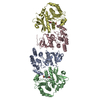 9axcC  9axhC  9axmC  9axxC  9axyC  9ay7C  9ayaC M: map data used to model this data C: citing same article ( |
|---|---|
| Similar structure data | Similarity search - Function & homology  F&H Search F&H Search |
- Links
Links
- Assembly
Assembly
| Deposited unit | 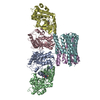
|
|---|---|
| 1 |
|
- Components
Components
| #1: Protein | Mass: 64798.465 Da / Num. of mol.: 2 / Mutation: Y340D Y341D Source method: isolated from a genetically manipulated source Source: (gene. exp.)  Homo sapiens (human) / Gene: RAF1, RAF / Production host: Homo sapiens (human) / Gene: RAF1, RAF / Production host:  Homo sapiens (human) Homo sapiens (human)References: UniProt: P08515, UniProt: P04049, glutathione transferase, non-specific serine/threonine protein kinase #2: Protein | Mass: 43518.988 Da / Num. of mol.: 2 / Mutation: S218A S222A Source method: isolated from a genetically manipulated source Source: (gene. exp.)  Homo sapiens (human) / Gene: MAP2K1, MEK1, PRKMK1 / Production host: Homo sapiens (human) / Gene: MAP2K1, MEK1, PRKMK1 / Production host:  Homo sapiens (human) Homo sapiens (human)References: UniProt: Q02750, mitogen-activated protein kinase kinase #3: Protein | Mass: 27807.064 Da / Num. of mol.: 2 Source method: isolated from a genetically manipulated source Source: (gene. exp.)  Homo sapiens (human) / Gene: SFN, HME1 / Production host: Homo sapiens (human) / Gene: SFN, HME1 / Production host:  #4: Chemical | Mass: 488.464 Da / Num. of mol.: 2 / Source method: obtained synthetically / Formula: C22H18F2N4O5S / Feature type: SUBJECT OF INVESTIGATION Has ligand of interest | Y | Has protein modification | Y | |
|---|
-Experimental details
-Experiment
| Experiment | Method: ELECTRON MICROSCOPY |
|---|---|
| EM experiment | Aggregation state: PARTICLE / 3D reconstruction method: single particle reconstruction |
- Sample preparation
Sample preparation
| Component | Name: CRAF/MEK/14-3-3 complex with NST-628 / Type: COMPLEX / Entity ID: #1-#3 / Source: RECOMBINANT |
|---|---|
| Source (natural) | Organism:  Homo sapiens (human) Homo sapiens (human) |
| Source (recombinant) | Organism:  |
| Buffer solution | pH: 7.5 |
| Specimen | Embedding applied: NO / Shadowing applied: NO / Staining applied: NO / Vitrification applied: YES |
| Vitrification | Cryogen name: ETHANE |
- Electron microscopy imaging
Electron microscopy imaging
| Microscopy | Model: TFS GLACIOS |
|---|---|
| Electron gun | Electron source:  FIELD EMISSION GUN / Accelerating voltage: 200 kV / Illumination mode: FLOOD BEAM FIELD EMISSION GUN / Accelerating voltage: 200 kV / Illumination mode: FLOOD BEAM |
| Electron lens | Mode: BRIGHT FIELD / Nominal defocus max: 2500 nm / Nominal defocus min: 1000 nm |
| Image recording | Electron dose: 50 e/Å2 / Film or detector model: FEI FALCON IV (4k x 4k) |
- Processing
Processing
| CTF correction | Type: PHASE FLIPPING AND AMPLITUDE CORRECTION |
|---|---|
| 3D reconstruction | Resolution: 4.36 Å / Resolution method: FSC 0.143 CUT-OFF / Num. of particles: 83248 / Symmetry type: POINT |
| Refinement | Cross valid method: NONE |
 Movie
Movie Controller
Controller



 PDBj
PDBj